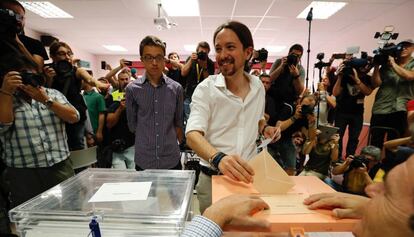Spain’s politicians urge high turnout to avoid repeat of December’s inconclusive poll
Almost 23,000 polling stations open throughout Spain without incident

The leaders of three of the four main parties in Spain’s general election – acting Prime Minister Mariano Rajoy of the Popular Party (PP), Socialist Party (PSOE) leader Pedro Sánchez, and Pablo Iglesias of the Podemos-United Left coalition Unidos Podemos – voted early in Madrid on Sunday morning, urging the electorate to turn out en masse.
In Barcelona meanwhile, acting Interior Minister Jorge Fernández Díaz, the PP’s candidate in the Catalan capital, and who finds himself at the center of a scandal over a leaked telephone conversation in which he appears to approve ordering investigations into leading Catalan pro-independence politicians, faced critics and supporters at his local polling station.
Overall, voting has begun largely without incident throughout the country
Also in Barcelona, Albert Rivera, the leader of Ciudadanos, which along with Podemos has emerged as a major force in Spanish politics over the last two years, voted early, calling for what he called “moderate people” to turn out to vote.
Carles Puigdemont, the head of the regional government of Catalonia, also called on the electorate to vote, while Gabriel Rufián, the candidate for the Catalan Republican Left party, called on voters to defend the interests of the region.
In Madrid, Albert Garzón, the Unidos Podemos candidate in the capital, and Mayor Manuela Carmena were among the first voters. “The important thing is that as many people as possible vote and that there is a government soon,” said Carmena.
While refusing to comment on whether this Sunday’s elections will be a repeat of the December 20 poll that produced a six-month stalemate, and thus lead to a third election, Carmena expressed the importance of a high voter turnout if a government is to emerge after today’s vote. “A high turnout will bring change,” said Garzón.
In the Basque Country, Íñigo Urkullo, the Basque Nationalist Party (PNV) head of the regional government, along with Socialist Party challenger Patxi López, said they expected a high turnout in the northeastern region. The head of the Canary Islands regional administration, Fernando Clavijo, said: “Today is a day to vote with our heads and not with our hearts.”
Overall, voting has begun largely without incident throughout the country, although the windows of the Socialist Party’s offices in the north of Córdoba province were broken during the night.
More than 36.5 million Spaniards could vote today
A total of 36,518,100 Spaniards could go to the polls between 9am and 8pm today for a second round of general elections, which will reveal what around 70% of the population feel about the four main parties – the traditional PP on the right and the PSOE on the left, as well as new contenders, Cuidadanos and the Podemos-United Left coalition, Unidos Podemos.
With the help of 197,245 newly registered voters, the electorate will choose 208 senators and 350 representatives who will then try to form a government, hopefully with better results than were produced after the general election six months ago.
Perhaps wearied by the idea of a second visit to the polling stations in such a short period of time, many Spaniards have joined the 1,920,256 overseas voters in posting their vote, boosting the use of the postal ballot by 85%.
Spaniards voting from abroad are mainly from Galicia – 443,566 voters, Madrid – 263,955 voters, Andalusia – 224,420 voters, Catalonia – 205,906 voters, Castille and León – 145,315 voters and the Canary Islands – 140,580 voters.
There are 1.1 million more women than men who can vote, with the majority of voters falling within the 35 to 54 age demographic.
The largest number of representatives (61) will be voted in by Andalusia, which has 6.5 million potential voters. Catalonia is next with 5.51 million potential voters, then Madrid with 4.92 and Valencia with 3.61. The regions with the lowest number of potential voters are La Rioja with 247,69, Navarre with 502,516 and Cantabria with 498,195.
English version by Heather Galloway.
Tu suscripción se está usando en otro dispositivo
¿Quieres añadir otro usuario a tu suscripción?
Si continúas leyendo en este dispositivo, no se podrá leer en el otro.
FlechaTu suscripción se está usando en otro dispositivo y solo puedes acceder a EL PAÍS desde un dispositivo a la vez.
Si quieres compartir tu cuenta, cambia tu suscripción a la modalidad Premium, así podrás añadir otro usuario. Cada uno accederá con su propia cuenta de email, lo que os permitirá personalizar vuestra experiencia en EL PAÍS.
¿Tienes una suscripción de empresa? Accede aquí para contratar más cuentas.
En el caso de no saber quién está usando tu cuenta, te recomendamos cambiar tu contraseña aquí.
Si decides continuar compartiendo tu cuenta, este mensaje se mostrará en tu dispositivo y en el de la otra persona que está usando tu cuenta de forma indefinida, afectando a tu experiencia de lectura. Puedes consultar aquí los términos y condiciones de la suscripción digital.








































